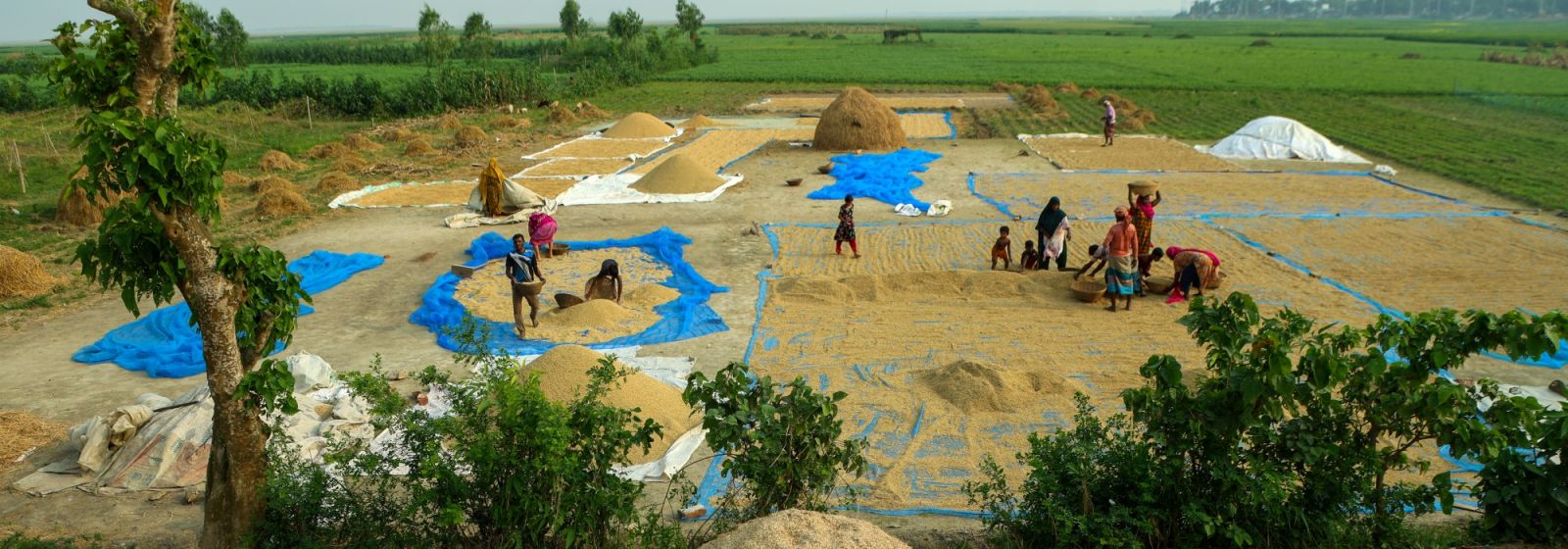Bushra Humaira
Dhaka, Bangladesh – In collaboration with CGIAR’s Scaling for Impact (S4I) Program, the International Rice Research Institute (IRRI) is dedicated to fostering strong partnerships that promote the widespread adoption of rice-based innovations in Bangladesh. This includes initiatives such as the Cluster-based Farmer Field School model, Wife Husband Model, Dry-direct Seeded Rice, Nature-based soil fertility management, and Improved Fodder.
IRRI is actively engaging in a series of technical workshops and strategic meetings with crucial partners, including the Department of Agricultural Extension (DAE), Agricultural Information Services (AIS), and the Palli Karma-Sahayak Foundation (PKSF). This collaborative effort is aimed at laying a solid foundation for transforming agricultural systems in Bangladesh, particularly in one of the world's most climate-vulnerable regions.
These initiatives are part of IRRI’s broader mission to identify effective pathways for scaling innovations. By demonstrating technologies and aligning with national development priorities, building institutional capacity, and shaping inclusive policies, we hope to address the pressing challenges of climate change. As these challenges intensify, especially in the vulnerable coastal areas of Bangladesh, the timely scaling of appropriate innovations is becoming increasingly critical.
Strategic Partnerships to Unlock Systemic Change
As Bangladesh continues to grapple with the pressures of climate change and eco-system degradation, coastal region of the country has seen an increase in salinity and natural disasters. To tackle this, the International Rice Research Institute (IRRI) is extending its efforts to ensure that agricultural innovations and reach the fields where they are needed most.
In Bangladesh, IRRI is a part of Scaling for Impact, CGIAR’s program fully dedicated to scaling food, land, and water innovations, is driving this change by linking science to systemic, inclusive impact.
IRRI and PKSF: Building a Pathway for Scalable Innovation
In a recent knowledge-sharing workshop held in Dhaka, IRRI, in collaboration with PKSF, a national institution dedicated to poverty alleviation and sustainable development, brought together researchers from CGIAR centers under Scaling for Impact Program, including IRRI, CIMMYT, and CIP, to present a portfolio of scalable agricultural innovations.
The workshop aimed to explore collaborative avenues to integrate innovations into PKSF’s existing and planned projects, particularly those in climate-affected southern regions of Bangladesh.
“We see significant potential in these innovations,” noted Mr. Md. Habibur Rahman, Deputy General Manager (Program), PKSF. “There is scope to integrate them into our projects like Rural Microenterprise Transformation Project (RMTP), Sustainable Microenterprise and Resilient Transformation (SMART), especially in the coastal belt.”
Presentations showcased a diverse array of technologies and approaches, including:
- Community-coordinated agronomic innovations for coastal polders from Dr. Manoranjan Mondal, IRRI
- Digital agriculture solutions tailored for Bangladesh from T.S. Amjath Babu, CIMMYT
- Diversified cropping systems and compost-based soil improvement from Dr. Sharif Ahmed, IRRI
- Zero-tillage potato cultivation in the south from Ebna Rahaman, CIP
- Policy recommendations for climate-smart water management from Dr. Ahmad Salahuddin, IRRI
Discussions led to several key outcomes such as renewed commitment to develop a new Memorandum of Understanding (MoU) between IRRI and PKSF and exploration of a joint project proposal aligned with PKSF’s development goals.
“To achieve durable and inclusive change, we must go beyond research and engage deeply with national actors,” said Dr. Ahmad Salahuddin, IRRI. “These platforms allow us to co-develop scalable models aligned with policy, infrastructure, and local needs.”
Aligning Science with Systems: Workshops with DAE
IRRI also organized a technical workshop with the Department of Agricultural Extension (DAE) Khulna, focusing on critical challenges such as soil degradation, salinity, and water management in coastal polders. The event featured valuable insights from DAE Additional Secretary Mr. Md Zakir Hossain and Deputy Commissioner Ms. Sharmin Akter Jahan.
The workshop was inaugurated by Md. Rafiqul Islam, Additional Director of DAE, Khulna Region. Technical sessions began with a presentation outlining the historical and current conditions of polders, rivers, canals, and sluice gates in the Khulna region.
The IRRI team, Dr. Manoranjan Mondal, Dr. Sharif Ahmed, and Dr. Ahmad Salahuddin, presented rice-based innovations tailored to the coastal context.
Following their presentations, sessions explored the integration of oilseed crops, maize, pulses, spices, and horticultural crops into sustainable cropping patterns suited to the region. Regional representatives from DAE, the Soil Resources Development Institute (SRDI), and the Horticulture Department also shared various innovative practices relevant to local conditions.
Discussions throughout the workshop highlighted the importance of crop diversification, building resilience to climate stressors, and maximizing land productivity through strategic and adaptive crop planning.
Leveraging AIS to Drive National-Level Dissemination
Recognizing the power of information, IRRI also convened a planning meeting with the Agricultural Information Services (AIS) to discuss leveraging AIS’s digital and print platforms for national-level dissemination of rice-based innovations. The focus was on aligning IRRI’s scaling ambitions with AIS’s outreach infrastructure, ensuring that research-backed practices can reach farmers in a language and format they understand.
Participants from both institutions discussed building a collaborative roadmap, co-creating digital content, and providing capacity-building workshops for AIS extension agents. There was strong agreement to jointly publish a special edition of Krishi Katha which has a readership of 80,000 farmers and extension officers featuring IRRI’s innovations and to formalize the partnership through an MoU.
Toward a Transformative Vision
IRRI is partnering with institutions to drive science-based, systemic change that will improve farmers’ livelihoods, boost food security, and advance Bangladesh’s climate resilience goals. By connecting innovations to policy, digital tools, and extension services, IRRI will create stronger, more coordinated efforts that deliver impact at scale.
Through the Scaling for Impact program, IRRI is reaching millions, strengthening local institutions, and enabling institutional environment to pursue policies that are inclusive, practical, and transformative. These partnerships are expected to give IRRI Bangladesh an opportunity to be prepared for a long-term program for scaling innovation with support from a community of leading actors in agricultural research and development.

